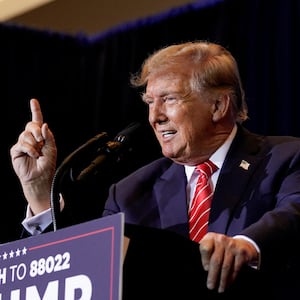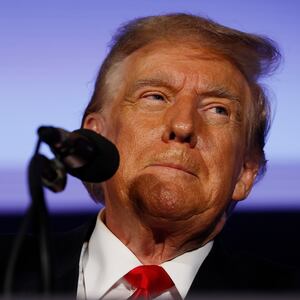The nine New Yorkers on the federal jury hearing E. Jean Carroll’s latest defamation case against Donald Trump have a big question ahead of them in the coming days: How much will they have to punish a billionaire like Trump to stop him from continuing to insult the journalist who accused him of rape?
The former president commands a massive real estate portfolio, still proudly declares himself a billionaire, and is sustained by a political war chest that he uses for legal fees. That’s what jurors will contend with when figuring out how to correct his increasingly hostile behavior—if they even can.
Carroll, the longtime magazine advice columnist, already won her first trial last year, when a separate jury concluded Trump attacked her at a department store in the mid-1990s and forced his fingers inside of her against her will—a verdict that cost him $5 million.
Trump is now on trial strictly to determine the extent of the damages that came from the disparaging remarks and false denials he made while at the White House in 2019—along with what it will take to discourage him from continuing his defamatory attacks.
On the first day of trial, U.S. District Judge Lewis Kaplan told the jury it would be entirely up to them to come up with a dollar figure that would “deter him from defaming her in the future.”
But the odometer is ticking upward, and Trump keeps flooring the pedal.
The former president has put on a stunning show of insolence from the moment that first verdict came down. The very day after the May 2023 trial ended, Trump appeared at an ill-conceived CNN town hall where he called Carroll a “wack job” while sarcastically joking that “she was immediately attracted to me, and we had this great chemistry.”
“I don't know her. I never met her. I have no idea who she is,” Trump said while a crowd of MAGA fans cheered him on at Saint Anselm College’s auditorium.
He’s only ratcheted up the insults on the 2024 Republican primary campaign trail.
“It’s a made-up, fabricated story,” he said in New York City on Wednesday, shortly before boarding a plane to campaign in New Hampshire ahead of the primary election there.
He disparaged her again a rally on Sunday, where his campaign barred NBC correspondent Vaughn Hillyard for merely asking a congresswoman about the rape case.
On his Truth Social network, Trump has posted dozens of times in recent days—sometimes while he sat in the federal courtroom—calling her a liar. Just yesterday, he wrote about the black coat dress Carroll kept for years as evidence of the attack—one that lab tests showed still retained some traces of DNA. (Trump refused to submit a sample of his own DNA before a trial deadline.)
“The Monica Lewinsky type gambit failed badly,” he wrote.
“THIS IS A FALSE ACCUSATION FORCED INTO THE PUBLIC EYE BY DEMOCRAT OPERATIVES LIKE HER LAWYER, HER FUNDERS, AND OTHERS,” he posted days earlier.
The unfettered chaos has warped the ongoing trial. While a legal battle of this magnitude would normally be a stoic exercise dealing with dated and carefully examined evidence, Trump’s continuing contemptuousness for the justice system has forced lawyers to keep submitting new evidence as the case goes on.
This came up on the second day of trial, when Carroll’s attorney questioned her about the incessant harassment.
“Ms. Carroll, has he continued to lie about you?” Roberta Kaplan asked.
“Yes, he has continued to lie. He lied last month. He lied on Sunday. He lied yesterday. And I am here to get my reputation back and to stop him from telling lies about me,” Carroll testified.
At that moment, it became clear that Trump’s own lawyers think they can stem the damage.
“Those statements are not at issue here,” defense attorney Alina Habba began to reason. The judge quickly stopped her—and made it clear that the door was, in fact, wide open.
“Overruled. Certainly relevant to punitive damages, at least,” he shot back.
In the legal realm, punitive damages are quite different from compensatory damages, which are the actual damages someone suffered. By contrast, punitive damages are meant to be a punishment that serves as a severe lesson to the transgressor.
Naturally, when it comes to massive corporations and the uber rich, the punitive damages can be sky high.
When a Los Angeles jury concluded that British-Greek billionaire Alki David (of hologram tech fame) sexually battered an ex-employee, they hit him with $8 million in compensatory damages—which were immediately eclipsed by the $50 million in punitive damages.
The rich usually understand the near limitless risk that comes with this kind of retaliatory discipline, which is the danger of handing jurors a blank check. When a federal judge allowed a former University of Minnesota student to seek punitive damages from the Chinese billionaire she said raped her after a night of drinks, the entrepreneur Richard Liu settled the case out of court the very next month.
Some seem to think Trump still cares about plugging the leak on this sinking boat.
“I don’t believe Trump will testify at the E. Jean Carroll trial for 3 reasons: he would subject himself to perjury and contempt charges and cause the punitive damages to skyrocket,” former federal prosecutor Kristy Greenberg commented on Twitter.
However, Trump shows no signs of backing down. In court, some observers casually noted that Trump seems to think he’ll never pay fines—either by means of legal maneuvering with appeals to a friendly Supreme Court, or by authoritarian refusal to abide by the law if he wins back the White House.
In fact, Trump’s two defense lawyers didn’t even counter the $12 million price tag that a marketing expert told jurors in court it would take for Carroll to repair her reputation—a “compensatory damages” figure that could easily be multiplied several dozen times to come up with a stiff enough punishment fit for a billionaire.
It’s clear that, if Trump is going to actually stop smearing Carroll, the sum will have to be much higher than it was last time.
At the first iteration of this trial, the jury awarded Carroll $5 million, but the punitive damages portion was only a tiny fraction of that, set at $280,000. It clearly wasn’t enough to make him shut up.
A year ago, U.S. District Judge Donald M. Middlebrooks swung the gavel like a hammer when he ordered Trump and Habba to jointly pay a $937,989 sanction for wasting everyone’s time with a revenge lawsuit against political rival Hillary Clinton. And yet, both ignored his blistering order and have brazenly returned to the judge, demanding that he reconsider the case in South Florida.
During the recent New York bank fraud trial, $15,000 in court fines proved insufficient to stop Trump from insulting the state judge’s law clerk. Only the ominous threat of throwing him in jail seemed to work. (That was on top of the $110,000 he paid in fines for failing to hand over evidence.)
But the next few weeks could mark a turning point. New York Supreme Court Justice Arthur F. Engoron is about to issue a judgment that, in part, seeks to punish Trump for routinely lying to banks—and that figure could go north of the $370 million requested by the state’s Attorney General. The judge is now grappling with how to deter a billionaire from flouting the law with impunity.
With only a few days left in this second rape defamation trial, the jury will be asking itself the same question.







